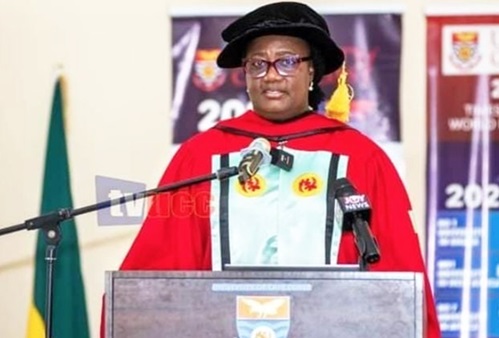A Professor of English Language at the University of Cape Coast (UCC), Dora Francisca Edu-Buandoh, says the country’s discourses are becoming increasingly toxic, and has therefore called for a conscious effort to readjust towards positive engagements.
She said that was necessary considering that the norms of respect and courtesies were crucial for impactful engagement for personal and collective national identity and growth as Ghanaians.
The professor said national discourses full of insults were a reflection of a negative national identity, adding that “wherever we use language as a people we are constructing an identity”.
Delivering her inaugural lecture on the topic, “Discourses of our Times: Power, Norms of Language Use and Identity Formation,” at UCC last Tuesday, Prof Edu-Buandoh said that was because “our identity as a people is closely linked to our discourses”..
She stated that language had been used in different contexts by persons she described as legitimate power holders to often manipulate others through discourses, often for selfish gains.
The professor of English Language described current national discourses as worrying, indecent, manipulative, controlling and lacking decorum.
Use ‘powers’ wisely
Prof. Edu-Buandoh said those with legitimate power, including those with academic, legal, political and media authority, must understand that power was transient, fragile and must be used wisely.
The Fulbright scholar and member of Linguistics Association of Ghana (LAG) and African Studies Association proposed an inclusive environment where everyone felt valued and respected by adhering to the social norms of language use.
Prof. Edu-Buandoh said it was important that persons with power positively used discourse to impact individual and institutions and to refrain from using it coercively, saying that led to rebellion, resistance and protests.
The first female Pro Vice-Chancellor of UCC said persons with power, including academic, legal, media, political and religious sometimes used such to control and manipulate people.
She observed that the political, religious and media sectors were some of the most disturbing culprits. Such, the professor of English Language said, used propaganda, insults, fear, emotional blackmail and selective teaching to get people to do what they wanted them to do.
The Chairperson of the 2012-2016 Presidential Committee on Emoluments of Article 71 Office Holders said the media also, as the fourth estate of the realm, had fanned the situation by blowing up some derogatory remarks and unsavoury language.
We have lost it
“I believe we engage in most discourses the way we do because either we do not know the norms of language use or we have lost it as a people,” the academician stated.
Prof. Edu-Buandoh said discourse was socially prescribed, and that it was important for all to understand the context and the people, and be decorous in the use of language.
She stated that the use of indecent language affected even Ghana’s Parliament, citing a research by her and another which indicated that 73 unsavoury comments, including some offensive, abusive and insulting language were used in Parliament between 2005 and 2018.
The professor of language said it had gone so bad that the Speaker himself had to use “unparliamentary” language to address unparliamentary comments.
Ethno-linguistic crisis
Prof. Edu-Buandoh also expressed worry that Ghanaians had negative perceptions about our language, saying it was obvious that as a country we were headed towards an ethno-linguistic identity crisis.
She said studies indicated that some Ghanaian students did not speak even one Ghanaian language, explaining that schooling had a way of making people speak English to ignore and look down on their language.
“Perhaps that is why we have an ethno-linguistic crisis looming,” she stated. Prof. Edu-Buandoh said language had been used to emphasise the “us” versus “them” which painted others negatively and “ourselves positively”, a situation which was impacting negatively on national cohesion and development.
She called for respect for all through the use of language. The Vice-Chancellor of UCC, Prof. Johnson Nyarko Boampong, commended Prof. Edu-Buandoh for her immense contribution to bettering the university and other institutional structures of governance and for the immense philanthropic work she embarked on.
Prof. Edu-Buandoh was the first female Provost of the College of Humanities and Legal Studies of UCC and first female Pro Vice-Chancellor of UCC.




































